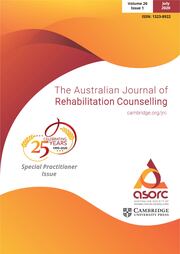Article contents
Working Therapeutically with Parents after the Diagnosis of a Child's Cerebral Palsy: Issues and Practice Guidelines
Published online by Cambridge University Press: 10 June 2014
Abstract
Little is known about the effectiveness of psychoeducational support groups on positive adaptation in parents and families after a child has been diagnosed with cerebral palsy. A systematic literature review adopting the Preferred Reporting Items for Systematic Reviews and Meta-Analyses (PRISMA) guidelines was conducted to gain an understanding of the process of adaptation in parents with a child with cerebral palsy and the effects psychoeducational support programs have on this process. The databases searched were psychINFO, Taylor and Francis Online, PsychARTICLES, Medline and ProQuest. A total of 1083 papers were found and 19 of those papers were analysed. A narrative approach was used to synthesise the data extracted. A number of factors that influence adaption within a family after the diagnosis of cerebral palsy in a family member were identified in the review. These factors include, but are not limited to, providing appropriate and relevant information to parents and families, identifying community services and resources available to the family, assisting in the reduction of psychosocial distress, and encouraging the facilitation and collaboration of a strong parent-professional partnership throughout the process. Based on this information guidelines for psychoeducation programs for this client group were proposed.
Keywords
- Type
- Review Article
- Information
- The Australian Journal of Rehabilitation Counselling , Volume 20 , Issue 1 , July 2014 , pp. 50 - 66
- Copyright
- Copyright © The Author(s), published by Cambridge University Press on behalf of Australian Academic Press Pty Ltd 2014
References
- 6
- Cited by


